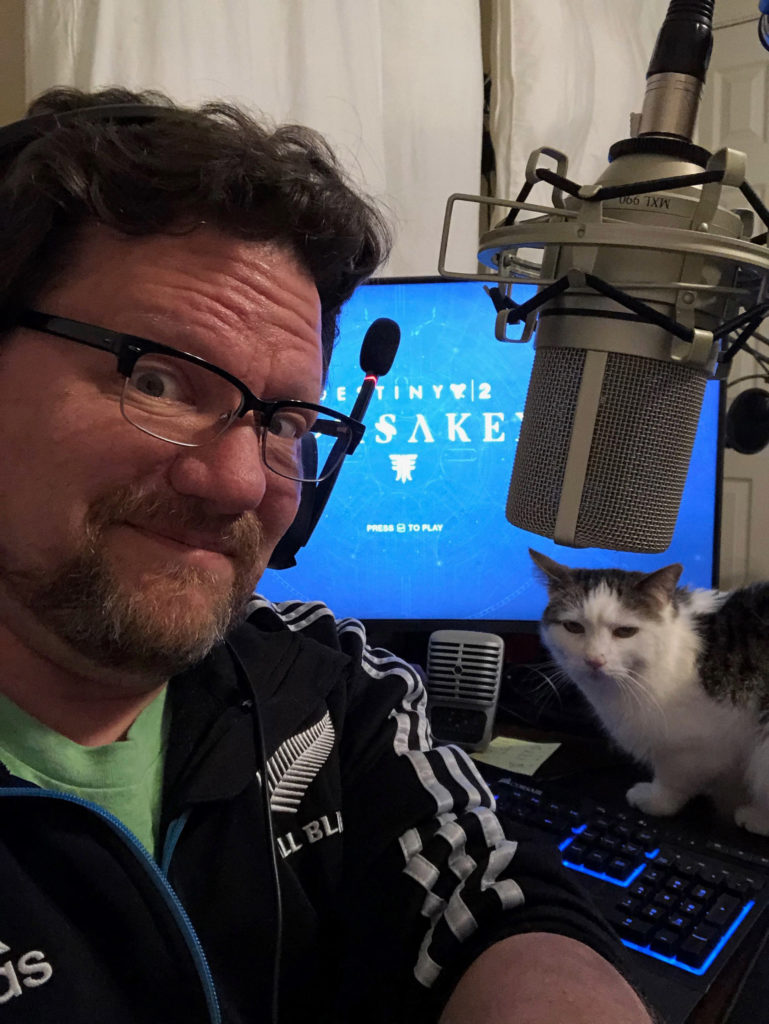
You might have heard me talk a little about this on The Shared Desk, or you might have bumped into me at an event and asked me “So, what’s next for you?†Well, since you are curious, here’s what I’m currently up to — I’m agent hunting.
If this comes as a shock to you, then you really should listen to The Shared Desk.
Yes, I’m looking for an agent. Bylines with the biggest publisher in “How To†books, awards and accolades for a successful steampunk series, and years of being in the business of storytelling does not shield me from starting from Square One all over again. See, my latest idea yielded a book that isn’t Science Fiction. It isn’t Fantasy. It’s not even Horror. My latest completed novel is a thriller.
Albeit, this is a thriller set in the video games and eSports industry, so it’s still very much me. Have no fear in that.

Since I’m braving undiscovered country, I’m putting together a cover letter and proposal for agents. Again, the confusion probably deepens as many of you know I’m no stranger to the D.I.Y. approach of publishing. Thinking about it, I want this title to find a home with a traditional publishing house (or, as the cool kids call it — trad publishing — which is…cool…I guess…). That means agent hunting; and seeing as how almost twenty years has passed between the last time I did this and now, a lot has changed…
…but some of the basics in seeking representation still stand.

If
you are hopping from one genre to another, have this new book idea of yours finished.
With
over fifteen years of writing under my belt, it would be an easy assumption to
think “Tee just has to pitch a book to an agent, and an agent will jump
through hoops to represent him.â€
Not necessarily.
While I’m known for writing Science Fiction, Fantasy and Non-Fiction, I’m not
at a level where I can write something down on a napkin and then, by the end of
the week, have a contract in hand. Especially in a genre where I would be
regarded as an unknown. Before launching my quest for representation, my
Thriller-in-Progress had to be ready upon request. This tells agents that any
uncertainty over writing a book not Science Fiction, Fantasy, or non-fiction is
unfounded.
Do your research about an agent (and an agency) before submitting your work. For those of you who are regulars on this blog, you all know how much of an advocate I am for research. A few minutes on Google will offer up authors, editors, and agents all offering you access to agents actively seeking new clients which makes the Internet somewhat redeemable in that moment. It’s easier and less intimidating pitching to an agent looking for new clients.
However…
Some of those resources with hyperlinks-a-plenty may be “evergreen†blogs, a trick in keeping traffic constant to a website by concealing date stamps from view. This is when you need to get your best Josh Gates on and continue digging. Is the agent you have a lead on still with the agency this article claims he or she to be affiliated with? Is this agent still accepting submissions? Is this agent still representing the genre you are writing in? Is this agency still in business? Homework doesn’t necessarily stop after finding a lead. Once you have those questions answered, you need to dig a little deeper. In my case, does this agent representing thrillers sound like a good fit for my thriller. Try to find out as much as possible on the person you are submitting to and what kind of book they want to represent.
Follow Submission Guidelines. Period. It would be very tempting for me, considering those fifteen years of experience, to think “This ain’t my first barbecue.†and play fast-and-loose with what an agent asked for in the way of submissions. “I know best,†after all. Right? In an agent’s eyes, your first real test as a potential client is a simple one: following Submission Guidelines. Some agencies will want the first chapter. Some might want the first three chapters. Some may make an assessment based on your first ten pages. What about Online Submission Guidelines? Have everything the agent asks for as one attachment. Have everything the agent wants in the body of the email. Have your files, including a cover letter, uploaded to a remote site of their choice. However the agent-in-question dictates, follow their directions. How you don’t may send up a fistful of red flags.

In your cover letter, drop your street cred like it’s hot. When you are starting off, you may not have a lot of accomplishments under your belt, but experience still counts. If you have written columns, name those publications by title. If you placed in a writing competition, let the agent know. If you’re a blogger with a following, share your analytics. I am fortunate in that I bring to the table a reputation for meeting deadlines and getting books done. With this current project, I make sure to mention Twitch for Dummies. This tells the agent that I have experience with a platform sharing deep ties with eSports. If this does come up in conversation, it also tells me this agent believes in my idea of an eSports thriller and understands how to pitch it. When sharing street cred, there is no need to share every accolade you’ve earned as a writer, mind you. Just the highlights.
Don’t
take any of the rejection personally. Nothing sucks worse when you send in a submission and receive a
rejection letter within 24 hours of sending said submission. It’s even
harder to cope with when other authors recommend you to their agent and you
still get rejected. Through all the rejections, I have held no grudges nor
grumbled about it as there was nothing personal behind them. This is the
attitude you must steel yourself with when sending out submissions. Yeah, I’ve
got accolades a plenty, but it does not prevent me from getting rejected. Just
remember — it happens to everyone. Nobody really talks about it. On either
side. Come on, are you going to be the agent that proudly proclaims “I
rejected Chuck Wendig!�
Exactly. Press on.

...or one would think.
Don’t be a douchecanoe. If someone turns you down, it’s more than okay to think “Their loss.†What’s not cool is going on your social media, calling out the agency that just turned you down, and ranting over the “grievous error they made in not signing ME on!!!†because that makes you look like a tool. Not the sharpest one in the box, I might add. Part of being a professional is how you deal with rejection, be it from agents, editors, critics, or fans.
I know there are friends in my circles asking me “Why don’t you just go the indie pub route?†Sure, you side-step all of this when doing so, and I would have no problems with that strategy. The process of self-publishing titles is nothing like it was back when I started my writing career in 2001, and it is indie publishing what affords Pip and myself time to expand the Ministry of Peculiar Occurrences universe. This go-round, though, I want to work with trad publishing. This means starting over.

This also means something new and unexpected lying ahead. And you know? That’s pretty freaking exciting.
Let’s do this.